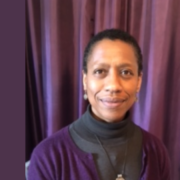CASA Advocate Claire Holston: A Little Effort for a Big Purpose
 The key to our wellbeing is multifaceted. Our physical, mental and spiritual health all contribute to our overall wellness. Claire Holston – a personal trainer, spiritual practitioner, social justice activist, and Court Appointed Special Advocate of New Hampshire volunteer – is certainly a proponent of this. Claire’s life could serve as a template for how to incorporate and nurture each of these components that, together, bring us fulfillment.
The key to our wellbeing is multifaceted. Our physical, mental and spiritual health all contribute to our overall wellness. Claire Holston – a personal trainer, spiritual practitioner, social justice activist, and Court Appointed Special Advocate of New Hampshire volunteer – is certainly a proponent of this. Claire’s life could serve as a template for how to incorporate and nurture each of these components that, together, bring us fulfillment.
Claire became a CASA in 2013 while working fulltime at BAE Systems in southern New Hampshire. She says, “I had a lot of flexibility with the supervisors that I worked with. In my job, I could manage my own time, and so I was able to fit in CASA training, or if I had to go to court. They were really receptive of that.”
Once retired, Claire shifted her focus from a career in operations to one supporting physical fitness and spiritual wellbeing. She offers in-home sessions through her personal training business, and is a licensed spiritual practitioner through the Centers for Spiritual Living.
Claire sees the value in giving back to her community. “I’m a social justice activist. I do a lot of church activities—I’m very involved in the church, both locally and at the conference level. I’m also involved in the community providing as much diversity, equity and inclusion training as I can.”
Included in all of these powerful acts of service is the transformational work she does as a volunteer child advocate. In nine and a half years as a CASA Claire has been a steadfast support for 10 children, ranging from infants to teenagers. Claire became a CASA over nine years ago. Her tenure includes a two-year hiatus between cases to allow her to focus attention on other priorities, after which CASA of NH excitedly welcomed her back.
One of the things that Claire enjoys most as a CASA is all the people she interacts with. She says, “You get to meet different people in all different settings. I don’t know if there’s a stereotype where people assume that only low-income families become involved with CASA, but it runs the gamut. There have been middle-class people that I’ve interacted with who have also run into issues with neglect and that type of stuff. I always enjoy meeting new people, regardless of who they are.”
Claire continues, “When you step inside different homes, you really get to understand the struggles that people are living with on a day-to-day basis. You can say that it’s a humbling experience. It certainly keeps you grounded in that you may think you’re having a bad day, or a bad situation, but there are others who are less fortunate, and they’re just needing somebody to show that they care.”
In addition to the families, CASAs also work with numerous case professionals. “You get in front of the judge, and you get to interact with DCYF. With the majority of DCYF folks I’ve worked with we’ve had a great connection,” says Claire.
When asked what has surprised Claire most about her work as a CASA, she responds, “That I’m still doing it. Because I didn’t know what I was walking into. I did take a year or so off because I had a lot of things that were going on and I just needed to prioritize them, and when I make a commitment I like to follow through. I didn’t know if I was going to come back when I took that break. But, you know, this work is really important. The people I interact with at CASA are all really nice. They’re all really good to me, and are available when I need to talk to them. Yeah, probably the biggest surprise to me is that I’m still doing it, almost 10 years later.”
Claire has worked on cases involving a wide variety of challenges, ranging from domestic violence to mental health. She reports that, “To see positive results, really for most of my cases so far, has been really rewarding for me.”
One case that stands out for Claire involved an infant whose parents both struggled with mental illness. The child was living temporarily with the grandparents. “We were able to find an adoptive family who was willing to let the grandparents stay involved in the baby’s life. So, I was able to walk step-in-step with them. It was a joy to go and visit. They were doing all the things they needed to do as adoptive parents. I was able to be in court with them on the day the child was turned over to them.”
For Claire and so many advocates, the CASA role is both challenging and enriching to their lives. “You know, I shouldn’t say it’s not all that taxing,” Claire says. “It all depends on the case that you get, each case is different. But it’s not a lot of time, really, to go and get to know a little one or a youth. It’s a little effort for a big purpose. It’s a small piece of the many things that I do in my life.” One of the many things that, together, contribute to a rich and fulfilling life.
If you would like to become a CASA volunteer advocate and help children, consider attending an upcoming virtual information session to learn more, or submit an application today.




